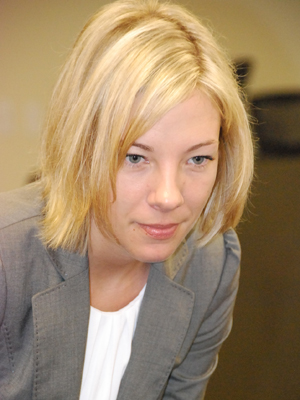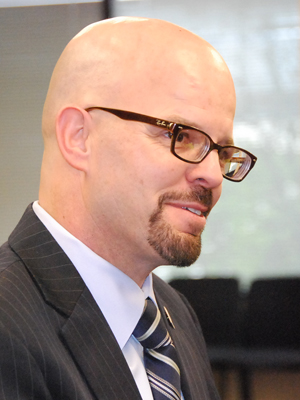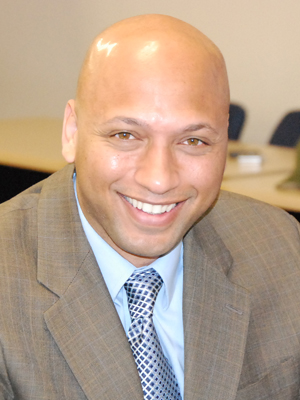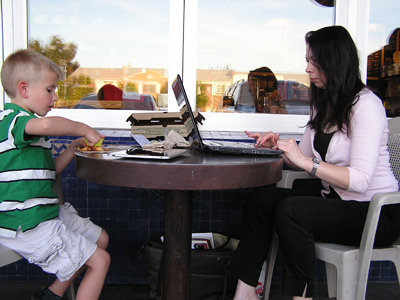Tracy Bespflug says she knew exactly what she was doing when she signed up at the University of Phoenix. "I did my research, so I certainly knew all of the criticisms that come along with University of Phoenix," she says. "And in making my decision I didn't let that interfere. When I made my decision I really thought of what is the best fit for me at this point in my life and what program will give me the best chance at success."
Like a lot of University of Phoenix students, Bespflug had tried college the traditional way. She grew up in Oregon. After high school she went to Johnson and Wales University in Rhode Island on a scholarship, but quickly realized it was a mistake. "It felt impossible at the time for me to be that far away from home and to have this complete culture and environment and geographic change," she says.
Bespflug went back to Oregon "with the good intentions of getting back to school." She started working full time and signed up for a few classes at a community college. She never finished those classes.
"Eight plus years later I found myself thinking, 'Wow, I really need to [get a degree],'" she says. But her options were limited.
It was 2008. Bespflug was working in the research department of a hospital in Portland and she knew she needed a degree to move up. She wanted to study health care administration. She was accepted to programs at public colleges and universities in Oregon, but the class schedules were a nightmare. She would be going to school almost every night of the week, and it looked like some of the classes were only offered during the day. She couldn't attend these programs and keep her job.
Bespflug checked out the University of Phoenix, and its program seemed much more do-able. Classes meet just one night a week for four hours. You take one class at a time and classes last five weeks. School runs year-round, so you can actually pack more classes into a year than at most traditional schools. Plus, the degree program Phoenix offered was exactly what Bespflug was looking for. It combined business and health care in a way that she says the public university programs didn't. She was sold. Bespflug started at Phoenix in October 2008 and graduated with a bachelor's degree in the spring of 2011.
Phoenix Action Commitment Team
Bespflug is one of the founders of an organization called the Phoenix Action Commitment Team, or PACT. It's a group of University of Phoenix students and graduates who say they are tired of the way their school gets portrayed by the news media and some politicians. "A lot of people have a misperception of the students as well as the institution," says Pete Farinosi, who founded PACT with Bespflug in 2011.
Farinosi is currently a Phoenix student, working on a bachelor's degree in global business management. He works as a security analyst for an international security firm.
Like Bespflug, Farinosi tried traditional college. That was 1987. He had been accepted at several universities but says his family couldn't afford the tuition. "That was probably one of the most disappointing parts of my life," he says. Farinosi had been expecting to go away to school, but instead stayed at home and went to a California community college.
Community college didn't last long. Farinosi got a job at a bank. "I moved up in their loan department," he says. "I was a mortgage underwriter." He kept getting promoted, making good money, "doing so well I wasn't thinking about going back to school," he says. He moved on from the bank to other jobs in business and finance.
Then the economy fell apart. He went from working as a partner in a real estate investment firm to working as a department manager at Office Depot. It was 2008. Farinosi needed a degree so he could build a new career.
He checked out the public college system in California. "I was trying to just meet with a counselor to review what the options were," he says. He was told he would have to wait three months to get an appointment. "Just to talk to them," he says with disgust.
His experience at the University of Phoenix was totally different. He walked into the campus in Gardena, Calif., just outside Los Angeles, and saw a counselor immediately. "We met, we talked, [and in] two weeks I was in class," he says.
Farinosi says he was skeptical about Phoenix at first. He knew the school had a reputation as a "degree mill." But he was impressed with the classes and he was learning a lot. Ultimately, he says, you get out of college what you put into it. "I'm not just here to get a piece of paper, I'm not here to just get a grade," he says. "I'm here to improve my skills, obtain new knowledge."
In February 2012, Farinosi and Bespflug organized a meeting for PACT members. It started at 9:00 on a Saturday morning in a conference room at the Phoenix campus in Gardena. Eight people showed up, most of them wearing business attire. The first order of the day was for each student or graduate to record a video testimonial about his or her experiences at Phoenix. One of the students, Ting Ting Wang, recruited her boyfriend to do the taping.
"I'm trying to tell him that he should come here," she said as she prepared to record her testimonial. "It's hard for him to enroll in community college."
Wang has lots of friends who can't get into California community colleges because of budget cuts and overcrowding. Her boyfriend, Marty Ty, says he hasn't made up his mind yet about Phoenix.
The University of Phoenix is a big commitment, says student Wendell Nelson. He's an assistant store manager at Barnes and Noble who showed up for the PACT meeting wearing a beige suit and a blue tie, looking like he was ready for a day at the office of a Fortune 500 company. Nelson is working on a bachelor's degree in business administration.
University of Phoenix students "are working their butts off," Nelson says. "We're working on coursework. We're working on our usual jobs. We're taking care of our families." Nelson is married and has three sons.
Nelson says a lot of people think a University of Phoenix degree is less legitimate or valuable than a degree from a traditional college or university, and that bothers him.
"Seems to me like wealthier kids that just come out of high school and go to a traditional university, they go there, sit through class, then they go party 'cause they have a lot of extra free time," he says. "I feel that a University of Phoenix student, pound for pound, is stronger than a younger student that doesn't have a lot of life experience or responsibilities."
Demographics
The University of Phoenix serves more women and African Americans than most colleges and universities in America.
Two thirds of the students at Phoenix are women. Nationally, 57 percent of students at colleges and universities are women. Eighteen percent of Phoenix students are African American, compared to 14 percent of college students nationwide. The University of Phoenix awarded more bachelor's degrees to minorities in the 2010-11 academic year than any other university in the country, according to a recent report.
Students who go to the University of Phoenix are also more likely to be from low-income families. According to data gathered by the U.S. Department of Education, more than 50 percent of undergraduate students at Phoenix use Pell Grants, which are government grants to help low-income students pay tuition. Nationally, 27 percent of undergraduates receive Pell Grants.
Other for-profit schools attract a disproportionate percentage of low-income students, too. Many advocates for these students are concerned about that, because tuition at for-profits tends to be higher than at public colleges and universities. Some students don't realize that when they enroll at the University of Phoenix.
Naomi Barton was looking for a way to get an associate's degree online. She had gone to college right after high school but quit after one semester. That was 2004. Now it was 2007, she was in her early 20s, married with two kids, living in Mesa, Ariz. "I looked around for online colleges," Barton says, "and University of Phoenix was the first one to poke in and say, 'Hey, come check us out.'"
She had given her information online, an enrollment adviser got back to her right away, and she signed up. She never looked at any other options. Phoenix "just sounded good," she says. "They had what I wanted." When asked what she wanted, Barton sighs and shrugs her shoulders. "School," she says.
She says she didn't really think about what a degree would cost, and she doesn't remember her enrollment adviser getting into much detail about the price. She got government grants and loans, but it turned out she didn't need much government assistance, because soon after she started at Phoenix her husband got a job as an enrollment adviser there. Barton says that gave her an 80 percent break on tuition.
She finished her associate's degree and started working on a bachelor's at the University of Phoenix. But before she was done, her husband lost his job. That was in 2010, part of a large layoff by the company to deal with declining enrollment brought on in part by bad press and a high-profile investigation of the for-profit college industry by U.S. Sen. Tom Harkin, a Democrat from Iowa.
The layoff meant no more tuition benefits for Naomi Barton. Suddenly Phoenix seemed expensive, so Barton looked around for other options. She discovered that Arizona State University had an online degree program that would cost her less. Barton quit the University of Phoenix and enrolled at ASU where she's working on a bachelor's degree in psychology. "I like ASU better," she says. "The instructors are able to set the class up how they want to, whereas at [University of Phoenix] it was pretty much set." The University of Phoenix uses a more standardized curriculum model than ASU.
Student Vickie Pedersen preferred the curriculum model at the University of Phoenix, and says the online learning technology at Phoenix was more advanced and user-friendly than at ASU. Like Barton, Pedersen went to Phoenix first and then switched to ASU, but for a different reason. She was concerned about the reputation of the University of Phoenix.
The Prestige Problem
Vickie Pedersen says she wanted to go to college after high school but her parents hadn't planned well financially and there wasn't enough money for tuition. "So I decided to take a year off to figure out how to make things work," she says.
One year turned into 20 years. Pedersen was working mostly in sales; a degree was never necessary to move up. But the fact that she hadn't gone to college kept nagging at her. "All of my friends have advanced degrees," she says. A lot of them went to Ivy League schools; she married a man who'd graduated from Harvard. She knew she needed to find a way to go to college.
Pedersen traveled a lot for her sales job. "I was gone every week for at least two or three nights," she says. "And it just dawned on me one day [that] while I was sitting on an airplane or in a hotel, I could be doing college work."
This was 2002. The University of Phoenix was well known for its online degree programs, especially in the Phoenix area where Pedersen lives. University of Phoenix billboards are everywhere. So Pedersen signed up. She didn't consider other options. She says the University of Phoenix was "incredibly expensive but I didn't care because I could fit it into my life." She and her husband could afford the tuition.
Pedersen thought the University of Phoenix was great, but after about two years she quit to have a baby. When it was time to think about going back to school again, the University of Phoenix was in the headlines. She didn't like what she was reading.
"People were questioning the validity of the education," she says. "So even though I didn't have a bad experience and I felt like the work was challenging and relevant, I was very concerned about paying that much money and then having it be worthless. I mean, I've already waited this long to get it -- now it better be worth it!"
Pedersen did her research this time and discovered there were a lot of options for getting a degree online; many of those options were not available back in 2002, but there had been an explosion in the growth of online learning in the intervening years. Pedersen chose ASU's online program because she wanted a degree from an established school with a good reputation. The University of Phoenix seemed too risky.
ASU started online degree programs in 2007. Phil Regier, dean of ASU Online, says, "If I took 100 people off the street in Phoenix and I said, 'Look, you can have a degree from ASU or the University of Phoenix,' I think 100 of them would say [they'd] rather have a degree from Arizona State University."
Regier says he admires the University of Phoenix for the way the school opened up education to more people at a time when traditional universities were not doing enough to make education convenient and accessible. But he believes ASU delivers a higher quality education.
The Quality Debate
"Quality" in higher education is a topic of much debate these days, especially as tuition continues to rise at all schools. Politicians and the public want to know that college is worth the tens of thousands of dollars people are paying for it.
For a long time, there wasn't much debate about quality. There was a pecking order; the "best" schools were the most selective schools. Basically, the colleges that could attract the most qualified students with the highest grades and test scores were considered the highest-quality schools, even though the caliber of the students a school attracts says nothing about how much those students actually learn while they're in college.
The University of Phoenix and other for-profit schools never participated in the "prestige game." Phoenix is an open-access school; you don't have to take tests or write application essays to get in.
PACT cofounder Tracy Bespflug thinks that's why some colleges and universities, and even some employers, look down on Phoenix degrees. She says her boss questioned her choice to go to Phoenix. "He told me I would face hurdles and things like that with my degree," she says.
She'd encountered the same skepticism from her stepmother. In both cases she sat down and showed them what her degree program looked like, what classes she was taking and what she was learning. She says they were both impressed.
"I'll have that conversation as many times as it takes to educate the people who just don't know," she says. "I look forward to the day where people realize it's the same" as other schools.









